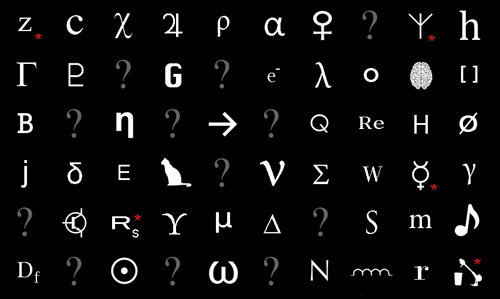the gleam of the glow of the shine of the sun
“. . . the gleam of the glow of the shine of the sun through the dearth of the dirth on the blush of the brick of the viled ville of Barnehulme has dust turned to brown; . . .”
—James Joyce, Finnegans Wake, 1939.
cadenzando coloratura!
“Say them all but tell them apart, cadenzando coloratura! R is Rubretta and A is Arancia, Y is for Yilla and N for greeneriN. B is Boyblue with odalisque O while W waters the fleurettes of novembrance.”
—James Joyce, Finnegans Wake, 1939.
Sixty Symbols
white telephones
“During dinner, it may be necessary to excuse yourself for a telephone call. However, it is far preferable to have a phone brought to the table. . . . [A]s a general rule, white telephones go with fish and poultry, and black ones with anything else.”
—Miss Piggy, Miss Piggy’s Guide to Life (As Told to Henry Beard), 1981.
white wine
“Don’t worry—the white wine came up with the fish.”
—Herman J. Mankiewicz, after being sick following a gourmet dinner. Quoted in MANK by Richard Meryman, 1978.
Technicolor Yawn
“Technicolor Yawn: Liquid Laugh.”
—Barry Humphries, glossary from Bazza Pulls It Off, 1972.
a mint-green polyester leisure suit
“Your right to wear a mint-green polyester leisure suit ends where it meets my eye.”
—Fran Lebowitz, Metropolitan Life, 1978.
Soylent Green
“It’s people. Soylent Green is made out of people.”
—Charlton Heston in Soylent Green, 1973. Screenplay by
Stanley R. Greenberg.
my pink-and-white body
“I believe I will dip my pink-and-white body in yon Roman tub. I feel a bit gritty after the affairs of the day.”
—W.C. Fields, My Little Chickadee, 1940.
The violet hush of twilight
“The violet hush of twilight was descending over Los Angeles as my hostess, Violet Hush, and I left its suburbs headed towards Hollywood. In the distance a glow of huge piles of burning motion-picture scripts lit up the sky. The crisp tang of frying writers and directors whetted my appetite. How good it was to be alive, I thought, inhaling deep lungfuls of coarbon monoxide.”
—S.J. Perelman, “Strictly from Hunger”, 1937.
